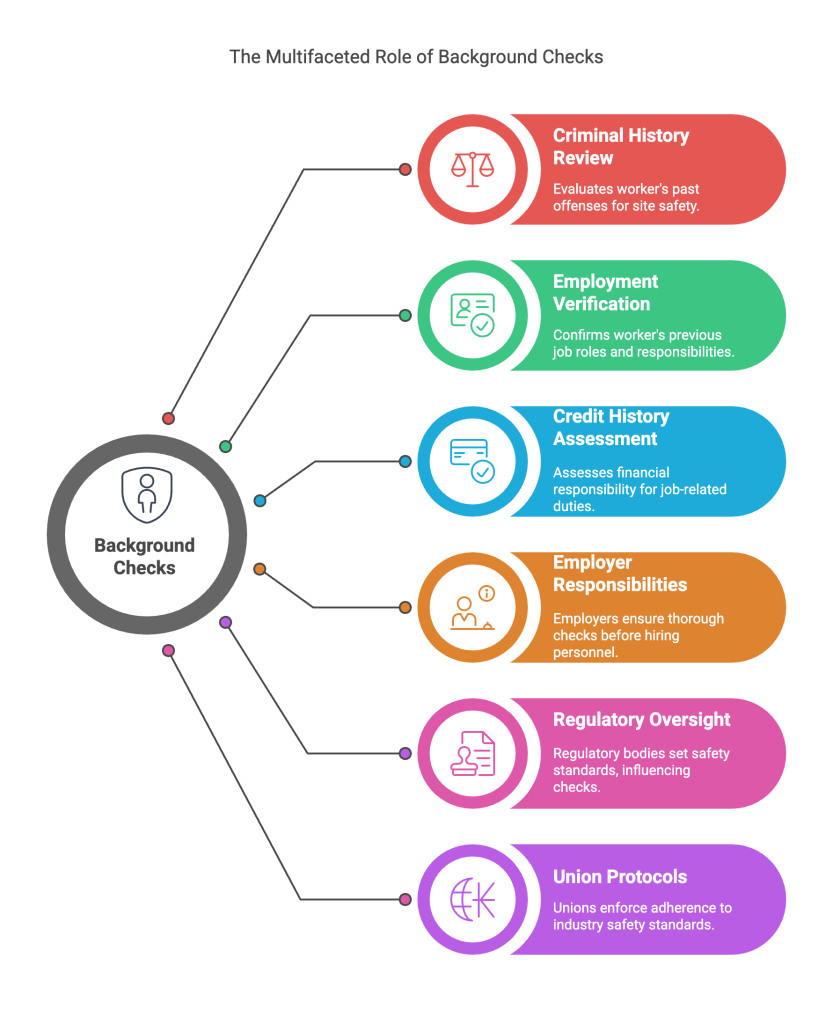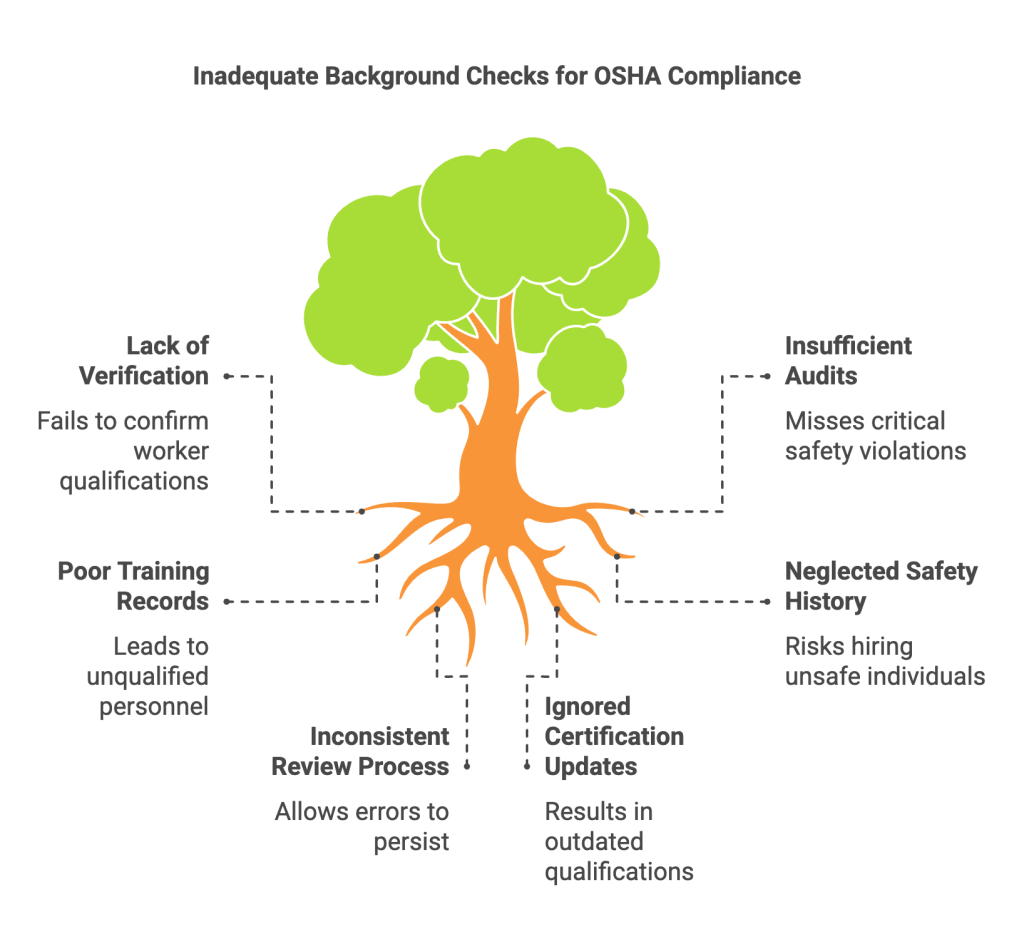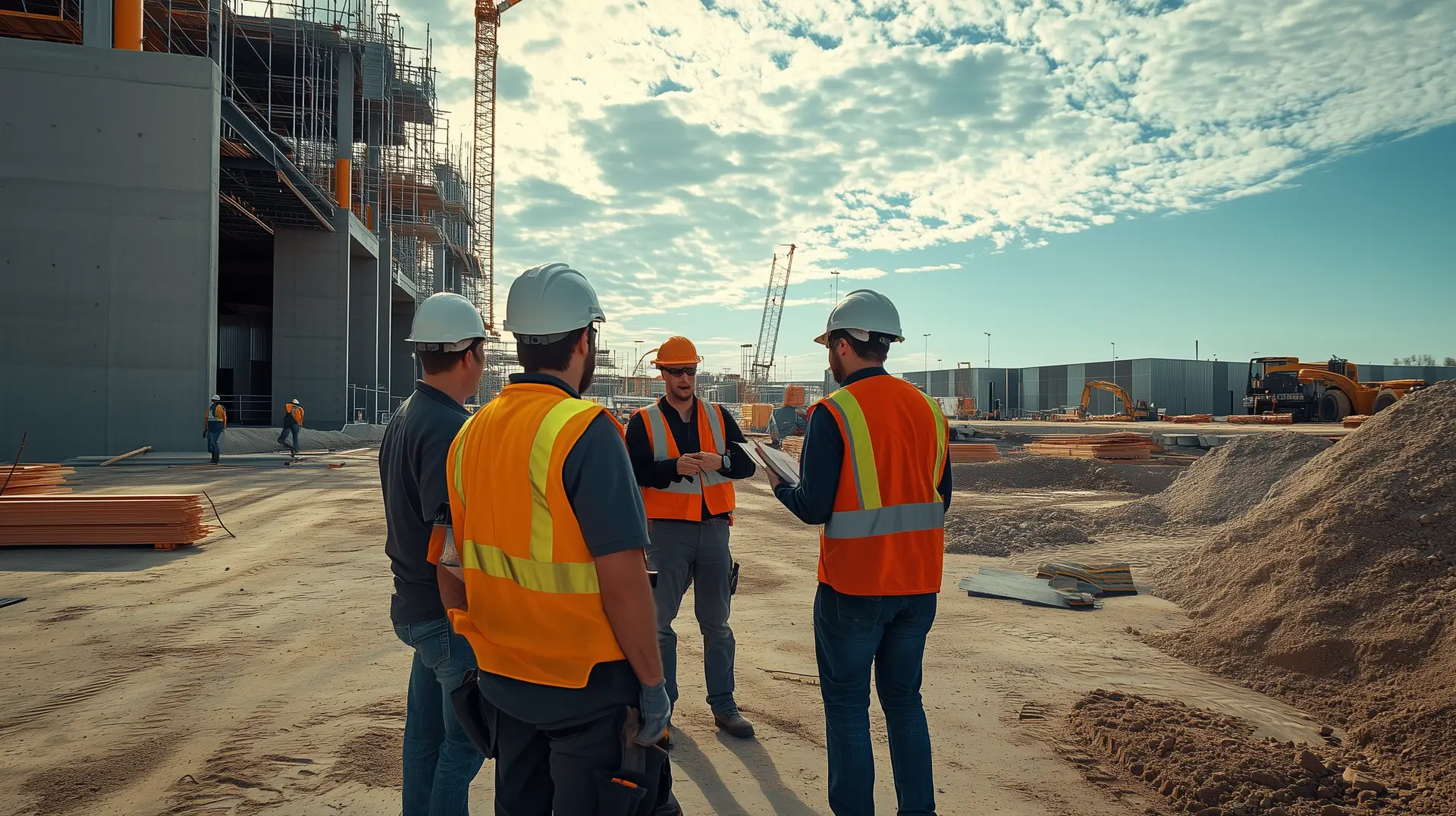In the rugged realm of construction, the stakes are high, and safety is paramount. Pennsylvania's construction industry, bustling with activity, requires a firm foundation in compliance and safety standards. For employers and employees alike, understanding the nuances of background checks is crucial to maintaining efficiency and security on-site.
This guide aims to demystify the intricate web of background checks within Pennsylvania's construction industry, shining a light on OSHA compliance and union regulations. Whether you’re an employer seeking to navigate regulatory complexities or a construction professional gearing up for your next project, this comprehensive guide will equip you with essential knowledge to bolster safety and compliance in the workplace.
Key Takeaways
- Background checks in Pennsylvania's construction industry are crucial for ensuring workplace safety and reliability.
- Employers need to thoroughly verify workers' credentials and past safety violations to meet OSHA compliance and prevent accidents.
- Construction unions add complexity to background checks, often requiring their own set of rigorous standards and screenings.
- Heavy machinery operators must undergo detailed background checks, including certification verification and substance abuse screenings, to ensure site safety.
- Legal compliance with background checks involves adhering to EEOC and Pennsylvania state laws, ensuring fairness and avoiding legal repercussions.
Introduction
Pennsylvania is a hub of construction activity. With skyscrapers reshaping city skylines and infrastructure projects weaving connections across the state, construction sites buzz with progress. Here, safety and compliance aren't optional; they're vital for success. Imagine a bustling construction site. Machinery hums, teams collaborate, and yet, the backbone of it all is unseen—background checks. They serve as the gatekeepers, ensuring that everyone on-site meets the necessary standards.
Background checks in construction are not just about ticking boxes. They're about trust, safety, and efficiency. They ensure that each worker is qualified, that each team member can perform their duties without risking harm to themselves or others. This process, often misunderstood, is crucial for maintaining a safe work environment. Pennsylvania's stringent regulations require adherence to specific standards, especially in an industry where mistakes can be costly.
Our guide untangles the complexities of Pennsylvania's construction industry background checks, with a sharp focus on OSHA compliance and union rules. Whether you're an employer aligning your practices with legal standards or a worker preparing for your next project, understanding these checks is essential. Through this guide, you'll gain insights and knowledge to keep your project running smoothly. The stakes are high, and preparation is everything.
Understanding Pennsylvania Construction Background Checks
Background checks in Pennsylvania’s construction industry are critical safety and compliance tools. These checks typically involve reviewing a worker’s criminal history, employment records, and sometimes credit history. The goal is to ensure that all personnel on a construction site are trustworthy and capable of performing their duties safely and efficiently.

The importance of these checks cannot be overstated. Construction sites are high-risk environments where safety is a top priority. Ensuring workers are free from past offenses that might pose dangers on-site is crucial. For instance, a past DUI conviction might disqualify someone from operating heavy machinery, directly impacting site safety.
Employers play a significant role in this process as they are accountable for conducting these checks before hiring. Unions often have their own protocols, adding a layer of oversight to ensure their members adhere to industry standards. Regulatory bodies like OSHA oversee adherence to safety regulations, and while they don't mandate background checks, they set the safety standards that drive the need for them.
Background checks serve as a foundational element in building a reliable workforce. They help identify candidates who meet the stringent requirements of safety and competence, reducing the risk of workplace incidents. As someone responsible for oversight, consider how your role in the background check process contributes to the overall safety and productivity of your team. Are you equipping yourself with the right tools and knowledge to make informed decisions?
PA OSHA Compliance
OSHA is a federal agency responsible for ensuring safe and healthy working conditions across various industries, including construction. In Pennsylvania, OSHA compliance plays a fundamental role in background checks, particularly in maintaining the safety standards expected on construction sites. Here are some key aspects you should be aware of.
OSHA’s regulations are vast, but several directly impact background checks. One crucial regulation mandates that employers verify training and certifications. This means confirming that workers have the necessary skill set for the job— a step that can prevent accidents and improve site efficiency. Another important regulation involves ensuring that past safety violations are scrutinized. This safeguard helps weed out individuals who may present safety risks.

To comply with OSHA, you need practical strategies. Start with a structured review process for checking credentials thoroughly. Are the candidate’s certifications up-to-date? Is there a history of prior safety violations? Answering these questions can improve compliance and safety outcomes. Implement regular audits of this review process to ensure nothing slips through the cracks.
Consider a case where an employer, by skipping background checks, hires an operator with previous safety violations. Shortly after starting, an incident occurs, potentially damaging equipment and harming others. This scenario underscores the importance of rigorous background checks.
As an anecdote from my 20 years in this field, there was an instance where a simple check revealed a worker’s revoked certification due to prior incidents. Addressing it upfront avoided significant liability. Ask yourself—are your background checks robust enough to catch similar issues?
Construction Union Screening
Unions in the construction sector wield significant influence, and their role extends into every facet of employment, including background checks. In Pennsylvania, the construction unions add a layer of complexity to the screening process. Unions ensure that their members are not only competent but also adhere to safety and ethical standards crucial for maintaining workplace integrity.
Construction unions often have their own set of requirements for background checks that complement or go beyond standard practices. These requirements might include a thorough review of a worker's criminal history, verification of past employment, and even drug testing. The goal is to ensure that only qualified and reliable individuals are admitted to union ranks and, by extension, trusted with projects.
Collective bargaining agreements also play a critical role in shaping the screening process. Such agreements may stipulate the kind of background checks required and the standards that must be met. For example, a union might negotiate for more comprehensive screenings for roles that involve greater responsibility or require higher security clearance.
Standard procedures for union screenings often align with broader industry practices, yet there are differences. Unions may insist on additional checks or assessments based on the specific demands of their membership. For instance, electricians might undergo more rigorous checks related to safety violations given the hazardous nature of their work.
Navigating these union-specific requirements can seem daunting, but understanding them is key. Employers must be mindful of these union guidelines to ensure compliance and maintain good standing with the unions. For construction professionals, aligning with these standards not only facilitates smoother entry into unionized positions but also enhances overall career prospects within the industry.
Heavy Machinery Operator Checks
Operators of heavy machinery are at the forefront of any construction project. Their work demands precision and accountability. Before you hand over the keys to a bulldozer or crane, thorough background checks are non-negotiable.
Experience is critical. Confirm each candidate's work history—assess their previous roles to verify experience handling similar machinery. Specific certifications, such as those from the National Commission for the Certification of Crane Operators (NCCCO), add credibility. These documents demonstrate the operator has met industry standards for safe operation.
Substance abuse screenings are another vital step. The stakes are high when operating heavy machinery, and sobriety ensures safety. Even a small lapse in focus can lead to severe accidents, putting lives at risk.
Include criminal history checks, focusing on any past incidents related to theft, violence, or substance abuse. While past legal issues don't automatically disqualify a candidate, any red flags demand thoughtful consideration regarding risk to the worksite.
Properly conducted background checks safeguard not only the operator but everyone on site. Are you confident in the rigor of your current process? Addressing potential risks upfront creates a safer, more secure construction environment.
Legal Considerations and Compliance
Understanding the legal framework around background checks in Pennsylvania's construction industry is essential. You must adhere to guidelines set by the Equal Employment Opportunity Commission (EEOC), which stresses nondiscriminatory practices. These guidelines instruct that while you can consider criminal histories, decisions should not disproportionately impact certain groups unless job-related and consistent with business necessity.
Pennsylvania offers specific regulations that complement federal laws. Here, the Clean Slate Law plays a key role, sealing certain nonviolent convictions from public view after a decade. This means you might not see every detail in a candidate’s history unless the role involves high trust, like financial oversight or vulnerable populations.
As an employer, your duties encompass clear communication: inform applicants of the checks, obtain consent, and provide notice if any adverse actions result from the findings. Transparency is not just good practice; it's mandatory under the Fair Credit Reporting Act (FCRA).
Employees have rights, too. They can request information about the checks you conduct and expect fairness in the process. If an adverse decision stems from a background report, they're entitled to review the findings and dispute inaccuracies. These steps are crucial for maintaining a straightforward and respectful hiring process.
Employers must navigate these guidelines with diligence. Complying ensures fair treatment and mitigates risks of legal repercussions, fostering a transparent hiring process. Familiarizing yourself with both federal and state regulations shields your practice and supports a fair working environment.
Conclusion
Understanding the ins and outs of background checks within Pennsylvania's construction industry is more than just a tick-box exercise—it's a commitment to safety and compliance that can define success on any project. From OSHA's stringent requirements to union-specific screenings, every corner of this process matters.
Background checks are not merely for filtering out unqualified candidates; they sculpt the culture of the entire site. By ensuring that every individual has the right qualifications, a cleaner safety record is the result. When operators of heavy machinery undergo thorough vetting, for instance, it's not just about resumes and past employment. It's about ensuring that those tasked with such enormous responsibility are fully equipped to manage the associated risks.
You, as an industry professional, hold a pivotal role in maintaining this standard. The checks you implement don't just protect workers; they safeguard your business from potential liabilities. Compliance with OSHA is non-negotiable—not just to avoid penalties, but to truly cultivate a culture of care and responsibility.
Looking ahead, staying attuned to evolving regulations will be key. With the landscape of safety standards ever in flux, being proactive instead of reactive sets leaders apart. Knowledge is armor, empowering you to not just meet but exceed the safety expectations of tomorrow's construction world. Keeping informed ensures that every groundbreaking ceremony and ribbon-cutting event marks not just the start of a project, but the continuation of a commitment to safety and excellence.
Frequently Asked Questions (FAQs)
What disqualifies you from construction work in PA?
Certain factors can disqualify you from construction jobs in Pennsylvania. These include a history of violent crimes, consistent issues with drug use, or repeated violations of safety regulations. Always check specific job requirements as they can vary.
Do PA construction unions require background checks?
Yes, most construction unions in Pennsylvania require background checks as part of their membership process. These checks are meant to ensure safety and integrity on the job site.
Can a felony prevent union membership in Pennsylvania?
Having a felony on your record can be a barrier to union membership, but it's not always a complete disqualification. Union policies may vary, and it may depend on the nature and recency of the felony.
How often do PA construction sites require drug tests?
Drug testing frequency varies by employer and project. Some sites conduct pre-employment tests, random tests, or tests after accidents. It's wise to be prepared for potential testing at any time.
Are OSHA violations included in background checks?
Yes, OSHA violations may be included in background checks. Employers want to ensure you have a good safety record and follow industry standards.
Can you work construction with a DUI in PA?
A DUI may not automatically disqualify you from construction work, but it can affect your ability to operate machinery or drive company vehicles. Employers will consider the specifics of your situation.
Do independent contractors need background checks in PA?
While not always mandated, many companies require independent contractors to undergo background checks to ensure safe and reliable work performance.
How to verify OSHA certifications in Pennsylvania?
To verify OSHA certifications, contact the training provider directly or check the OSHA Database. Certifications should be up-to-date and verifiable for credibility.
Are expunged records considered for union jobs in PA?
Expunged records are generally not considered when applying for union jobs in Pennsylvania. Once a record is expunged, it is typically treated as if it never occurred.
What’s the cost of construction background checks in PA?
The cost of background checks can vary but typically ranges from $20 to $100, depending on the depth of the check. Employers usually absorb this cost.
How does an apprenticeship affect my eligibility for construction work?
Completing an apprenticeship often enhances your eligibility and attractiveness to employers by providing hands-on experience and skill development.
Can military service benefit my construction career in Pennsylvania?
Yes, military service can be beneficial. Skills such as discipline, leadership, and experience with heavy machinery often translate well to construction roles.
What is the role of networking in finding construction work in PA?
Networking can be crucial. Building connections in the industry can lead to job opportunities and insider knowledge about job openings that aren't publicly advertised.
How do construction regulations in Pennsylvania affect your work?
Construction regulations ensure safety and quality. Understanding local regulations keeps your work compliant and can prevent legal issues down the line.
Definitions
Background Checks
A background check reviews an individual's history to assess their suitability for a job. In construction, this includes criminal records, employment verification, certifications, and in some cases, drug testing. You’re looking for any past behavior that could pose a safety risk. For example, a DUI history might disqualify someone from operating machinery. Are your checks detailed enough to spot risks before problems arise?
OSHA Compliance
OSHA compliance means following the safety rules set by the Occupational Safety and Health Administration. In construction, this includes verifying that workers have proper training and spotting any prior safety violations. It's not about paperwork—it’s about keeping people safe. Do you have a process in place to confirm that certifications are current and violations are tracked?
Union Screening
Union screening refers to a union's procedure for evaluating member qualifications. These may include criminal background checks, drug testing, and employment verification. Some unions add extra steps depending on the role. For instance, electricians may face more safety-related checks. Employers hiring union labor must follow these rules. Are your practices aligned with union agreements?
Heavy Machinery Operator Checks
These checks evaluate whether someone is qualified to operate equipment like cranes or bulldozers. You need to verify past job experience, relevant certifications (like those from NCCCO), and clear drug screenings. A history of violence or substance misuse may raise red flags. Would you feel confident handing that worker the controls?
Fair Credit Reporting Act (FCRA)
The FCRA sets the rules for how employers use third-party background checks. It requires employers to inform candidates, get written consent, and allow them to review and dispute findings. You can't make hiring decisions based on reports without following this process. Do your hiring procedures protect applicant rights and stay compliant?
References
Still have questions?
Get in touch with our team today for a personalized demo and discover how our tailored volume pricing and packages can drive results for your business!
How useful was this page?*
Note: your comments are anonymous. We use them to improve the website. Do not include any personal details.
Visit our FCRA Compliance Tool or leave a message here if you need a response.
From the blog Explore the GCheck Content Hub

How Long Do Background Checks Take for Government Jobs? Timeline Expectations for 2026
6 Jan, 2026 • 20 min read
Driver Qualification File Requirements: Your Complete DOT Compliance Guide
6 Jan, 2026 • 18 min read
Healthcare Background Screening Costs: 2026 Budget Planning Guide for Medical Facilities
30 Dec, 2025 • 23 min readThe information provided in this article is for general informational and educational purposes only and should not be construed as legal advice or a substitute for consultation with qualified legal counsel. While we strive to ensure accuracy, employment screening laws and regulations—including but not limited to the Fair Credit Reporting Act (FCRA), Equal Employment Opportunity Commission (EEOC) guidelines, state and local ban-the-box laws, industry-specific requirements, and other applicable federal, state, and local statutes—are subject to frequent changes, varying interpretations, and jurisdiction-specific applications that may affect their implementation in your organization. Employers and screening decision-makers are solely responsible for ensuring their background check policies, procedures, and practices comply with all applicable laws and regulations relevant to their specific industry, location, and circumstances. We strongly recommend consulting with qualified employment law attorneys and compliance professionals before making hiring, tenant screening, or other decisions based on background check information.

